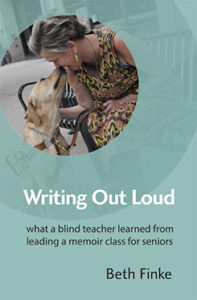The email came just before Father’s Day last year. A young woman wanted to know how to sign her dad up for my memoir-writing class. The request made me a little nervous. What if her dad didn’t like to write? Didn’t want to write? Couldn’t write?
It’d be a gift, she said.
A gift for him, or a gift for her?
So many of the people who find out I lead memoir-writing classes tell me how much they wish their parents had written their family stories down. Come to think of it, I am one of those people.
Two weeks after my third birthday, my father suffered a fatal heart attack at home. I don’t remember much about Ed Finke, but from stories Flo and my six older siblings shared I know he grew up in small-town southern Illinois. In exchange for a scholarship to a teacher’s college near Chicago, he was required to teach at a Lutheran elementary school after graduation. He taught one year, quit, and never looked back.
Why did my dad quit teaching? What happened that first year to change his mind? Maybe Eddie Finke never intended on a career in education. Did he accept the scholarship to escape rural life? Or his overbearing mother? Or to leave grief behind after his 7-year-old sister Wilma died of diphtheria?
I never got to ask him. When a friend from my dad’s college days told me decades later that Eddie was a good writer, I was fascinated — and disappointed. If he had put some of his own life stories on paper, I might know him better.
Considering all that, I had to commend the young woman who’d emailed me. She didn’t even ask her father if he wanted to take a memoir-writing class. She just signed him up. And guess what? Her father enjoyed the class so much that he signed himself up for a second session.
And then this year it happened again. A totally unrelated young woman emailed me with the same idea. “I was hoping to sign my father up for one of your classes,” she wrote. “He has just started writing his memoirs and I was looking for something that could help support his process.” Bill finished his first six-week session in May and emailed me a thank-you last week. “It was just what I needed,” he wrote.
Out of ideas for Father’s Day? Live in the Chicago area? Consider giving him a gift for both him and you: sign him up for a memoir-writing class. No memoir-writing classes available near where he lives? No problem. Gift dad with a copy of my latest book Writing Out Loud — available in paperback, on kindle, and at audible.com. Writing Out Loud is a whimsical look at how I manage, thanks in large part to my husband Mike Knezovich and Wonder dog Whitney, to live a creative and fulfilling life here in Chicago. I describe the classes I lead and all I learn from the writers who sign up, too, and that part might encourage your dad to start writing as well.
Oh, and the dad I mentioned at the start of this post? Tune in to my next post to find out what happened while preparing to read his essays out loud to the family — he has a good story to tell!

Brilliant idea! If my Dad were in Chicago I’d sign him up. Well, I have already offered him a couple or prompts to write an essays or two for their next college reunion.
If he enjoys writing as much as you do, his college friends are in for a treat!
That is a perfect Father’s Day gift, tucked in with the Mennen after shave lotion. With the 75th anniversary of D-Day just passing, I wish we had the memories of what our parents lives were like here at home while some of their friends were in the service. My kids have all ready said they appreciate the memories I’ve written by attending you class. They said they were things they never knew about and probably never would if it weren’t for you class….thank you.
Thanks for this, Cheryl. And interesting thought about whether people back home worried a lot about their friends and family in the war. Communication was so much sloer then, news wasn’t “instant,” letters took so long to go back and forth. Makes me wonder if they worried less> (no news is good news) or more?
Now that I write memoirs myself, I’m plagued with curiosity about my father and his family. He never talked about them and there’s nothing written down. I found a 1st cousin a few years back on Face Book and she tries to piece a family history together but her memory is as shot as mine!
You know, maybe that’s another benefit of writing memoir: It sparks our curiosity about our parents and their families. If that could help us understand some of the parental characteristics we’re not especially fond of, imagine the thousands of dollars we could save on therapy!
Beth I’m wondering if you could suggest what important, key events those of a bio that should be included. I’m trying to make a list of topics (events) to focus memoir essays and thought to ask for your advice. Hope this inquiry is clear? Thanks Beth.
This is a big question to answer in a comment to a blog, but hey, tI’ll do my best.
The first step is to figure out what big, broad part of your life you want to highlight in your memoir. Then list any and all memories you have that are associated with that theme — here are a few ideas to narrow in on that might help you with that list:
•Childhood influences
•Grade school
•Teenage years
•First job/s
•First love/s
•Parents
•Siblings/family
•Friends
•College/post high school
•Marriage
•Children
•Grandchildren
•Hopes and dreams
•Aspirations
•Failures
•Successes
•Regrets
•Resentments
Leave a Response